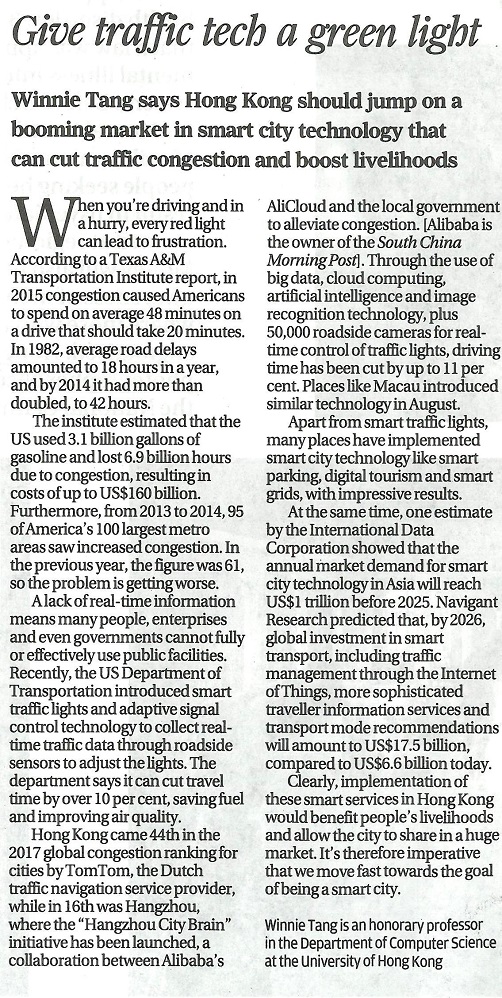網上版請按此

Give traffic tech a green light
Winnie Tang says Hong Kong needs to jump on a booming market in hi-tech city services, such as smart traffic lights, that can make commuting easier and boost livelihoods
When you're driving and in a hurry, every red light can leave you more and more frustrated. According to a Texas A&M Transportation Institute report, in 2015 congestion caused Americans to spend on average 48 minutes on a drive that should take 20 minutes. In 1982, average road delays amounted to 18 hours in a year, and by 2014 it had more than doubled, to 42 hours.
The institute estimated that the US used 3.1 billion gallons of gasoline and lost 6.9 billion hours due to congestion, resulting in costs of up to US$160 billion. Furthermore, from 2013 to 2014, 95 of America's 100 largest metro areas saw increased congestion. In the previous year, the figure was 61, so the problem is getting worse.
A lack of real-time information means many people, enterprises and even governments cannot fully or effectively use public facilities. Recently the US Department of Transportation introduced smart traffic lights and adaptive signal control technology to collect real-time traffic data through roadside sensors to adjust the lights. The department says this can cut travel time by more than 10 per cent, saving fuel and improving air quality.
Hong Kong came 44th in the 2017 global congestion ranking for cities by TomTom, the Dutch traffic navigation service provider, while in 16th was Hangzhou, where the "Hangzhou City Brain" initiative has been launched, a collaboration between Alibaba's AliCloud and the local government to alleviate congestion. [Alibaba is the owner of the South China Morning Post]. Through the use of big data, cloud computing, artificial intelligence and image recognition technology, plus 50,000 roadside cameras for real-time control of traffic lights, driving time has been reduced by as much as 11 per cent. Places like Macau introduced similar technology in August.
Apart from smart traffic lights, many places have implemented smart city technology like smart parking, digital tourism, smart grid and gerontechnology, with impressive results.
At the same time, one estimate by the International Data Corporation showed that the annual market demand for smart city technology in Asia will reach US$1 trillion before 2025. Navigant Research predicted that, by 2026, global investment in smart transport, including traffic management through the Internet of Things, more sophisticated traveller information services and transport mode recommendations will amount to US$17.5 billion, compared to US$6.6 billion this year.
Clearly, implementation of these smart services in Hong Kong would benefit people's livelihoods and allow the city to share in a huge market. It's therefore imperative that we move fast towards the goal of being a smart city.
Dr. Winnie Tang
Honorary Professor, Department of Computer Science, The University of Hong Kong